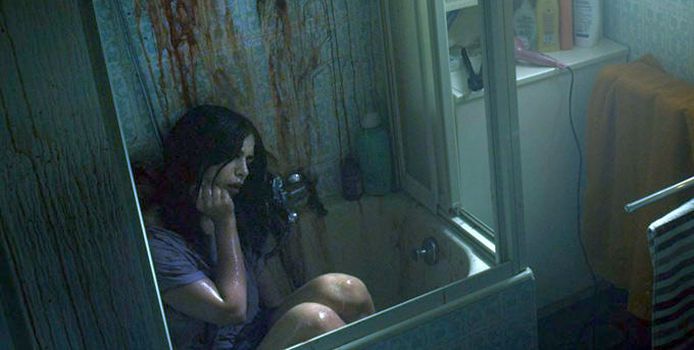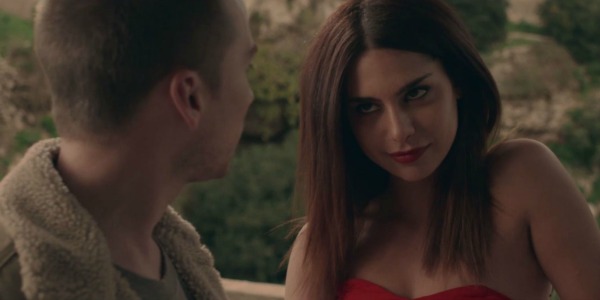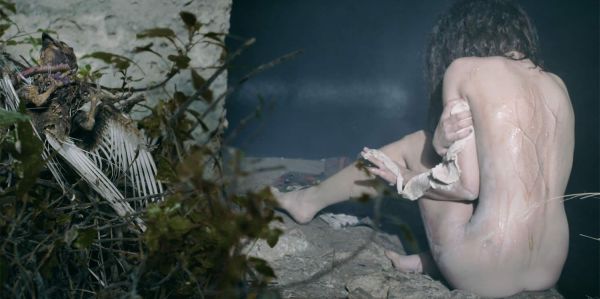SPRING: No Ordinary Love

Liam is an Australian freelance writer who currently resides in…
They say that love conquers all. Whether that is racial or gender inequality, the struggle of the underclass, global conflict or even the gulf of time. No matter what, there is a belief that love can cross all boundaries and transform the lives of those who experience it.
This can also be said of the characters in the fascinating indie horror Spring: two star-crossed lovers must overcome a unique biological divide which threatens to destroy their love just as it begins to flourish.
A modern romance
After his mother dies of cancer, Evan (Lou Taylor Pucci) takes a long-delayed trip to Italy where he meets the beautiful and enigmatic Louise (Nadia Hilker). Over the next seven days the couple’s whirlwind romance seems destined to grow into something deeper, yet Louise is hiding a dark secret.

Unbeknownst to Evan she is transforming, mutating into something wild and primordial. As her biological changes become more frequent, Louise quickly realises that she must end the relationship before the transformation cycle is complete. The biggest obstacle to her achieving this goal is that Evan is madly in love with her, and won’t give up on their relationship without a fight.
Spring is the very assured second feature from directing duo Justin Benson and Aaron Moorehead and, like their previous effort, the excellent Resolution, they once again have fashioned an intriguing and authentic drama which takes well-worn horror tropes and twists them in new and exciting ways.
Love is in the air
One of the many strengths of Spring is that it feels like an indie drama with horror elements, rather than a straight up shocker. Where it could have been yet another in the long line of interminable vampire romances, the filmmakers aim for something stranger and far more compelling. They are more interested in exploring the way love and relationships change us and how we can be transformed by love either emotionally, psychologically, or in the case of Louise, physically. But do we transform of our own free will or do we allow ourselves to be transformed by those who love us?

Pucci and Hilker bring a believable resonance to these ideas with their terrific performances, and Pucci gives Evan the right amount of painful malaise. He is a man adrift, searching for something in the world that he can hang on to. While Hilker is excellent at playing the mysterious aspects of Louise, she also brings a melancholy to the role that hints at a deeply rooted and possibly ancient understanding of the world.
Love is a many-tentacled thing
Amongst these romantic musings the filmmakers don’t shy too much away from the horrific elements of their script. Working within the constraints of a very low budget, Benson and Moorehead’s strong visual style comes through the modest aesthetics to bring an all pervasive feeling of dread to the proceedings that colour what would be in lesser hands a more typical indie drama.
The use of CGI to create Louise’s transformations is also very effective, getting big results out of a small effects budget. One scene when Evan accidentally interrupts her mid-change and her true nature is revealed is particularly impressive.

The directors also manage to utilise every resource they have to create an atmosphere of realism, allowing the more fantastic elements to develop naturally. Shot on location in Italy, they make the most of it by employing tracking shots which swoop down on the characters from above. It appears they have used remote control drone technology in order to achieve this, which is not only a clever way to add scope on a budget but also intensifies the atmosphere of the film to great effect.
Conclusion
Spring is a delight; a dark, twisted love story with real heart. Some folks may be put off by the more romantic sentiments, but its more original approach to horror make it a very different experience than what genre audiences have come to expect. Benson and Moorehead are filmmakers who love horror, but want to see cinema address it with a completely new and original take. This film is a “boy-meets-girl” story that re-contextualises the classic themes of love and relationships into classic body horror, something more akin to a film directed by David Cronenberg.
However, to compare these directors to anyone else is to diminish their talent and their ability to take their influences and transform them, like the character of Louise herself, into something new and maybe just a little unique.
QUESTION
Do you think “indie horror” is the next step for the genre or is it that the wrong way to go?
(top image source: Metrodome Group)
Does content like this matter to you?
Become a Member and support film journalism. Unlock access to all of Film Inquiry`s great articles. Join a community of like-minded readers who are passionate about cinema - get access to our private members Network, give back to independent filmmakers, and more.
Liam is an Australian freelance writer who currently resides in London. His passion is film and television but he is also fascinated by the strange, hard to explain yet undeniable corners of history and cultural ephemera.













